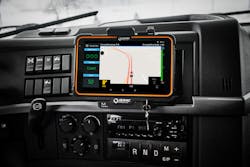How eco-driving techniques can make a difference in truck driver safety
For Guy Broderick, safety and training supervisor with Canada-based Kriska Holdings, there is no limit on what can be used as a teaching tool for the cross-border truckload carrier.
Kriska, which ranks No. 434 on the 2023 FleetOwner 500 for-hire list, operates a fleet of some 300 power units and has been working with drivers to help them adopt more eco-driving styles to improve safety, fuel efficiency, and operational costs. The fleet, which utilizes Isaac Instruments' real-time driver coaching tool to help train drivers, also just participated in a Traffic Injury Research Foundation (TIRF) study on the connection between eco-driving and safety.
“When we train people on how to eco-drive, it takes the stress off their shoulders,” Broderick, a former truck driver, noted during a March 21 Truckload Carriers Association webinar, hosted by Isaac Instruments. “I remember when I was first learning to drive, my father taught me that you never want to pull away from a light really fast, you want to pace yourself between the lights.”
Broderick pulls that same page from his father’s playbook when it comes to coaching and training Kriska’s professional drivers. He explained that when drivers use a coaching system and begin to adapt to more eco-driving techniques to avoid harsh braking, following too closely, and making hard turns, they begin “pacing themselves and driving sensibly.” Those techniques, he added, have made a difference when it comes to fleetwide safety and fuel economy.
At Kriska, the company has seen the benefits of using a coaching program like Isaac’s tenfold, Broderick noted. The carrier also uses forward-facing cameras as a driver coaching tool.
“I have been involved with video systems for roughly seven and a half years now,” Broderick explained. “When I was first introduced to them, I thought they were an amazing training tool. Not that you want to focus on someone’s mistakes, but it’s a great tool to review with the driver.”
See also: Machine learning predicts the future of driver safety
Since implementing forward-facing videos at Kriska, every year the carrier conducts summer and winter refresher safety training courses for company drivers. This year, Broderick noted, the carrier took snippets of incidents from company trucks and implemented those clips into its driver training sessions.
He added that video footage also encourages drivers to make sure they are constantly aware of their surroundings on the road.
“It really gives a whole different perspective from being that student in the classroom to ‘wow, this actually happened to our own trucks,’” Broderick noted, adding that video has also been a way the fleet can praise drivers for their safety efforts or showcasing drivers’ courageous acts on the road.
And, at times, Kriska has shared camera footage from accidents with different police departments in both the U.S. and Canada to help authorities pursue specific motor vehicle violations in ongoing crash investigations.
In one instance, Kriska video footage captured a company truck driving along on a highway in St. Louis, where a passenger car drove up on the side of the truck and hit an SUV, knocking that SUV off the road, before speeding away. The truck camera picked up the entire scene, and the truck driver immediately veered to the side of the road to help the injured SUV driver, who survived but ended up in the hospital in critical condition.
An hour later, Broderick got a phone call from one of the police officers at the scene asking about the camera footage. The carrier obtained the video footage from Isaac and sent it to police for further investigation.
“It’s a simple process for us to get the video from Isaac and send it over to that select department,” Broderick said. “A lot of times, they are incredibly appreciative because it gives you that eyewitness story.”
Study points to benefits of eco-driving
The objective of TIRF’s study, which is not yet public, is to analyze how changing driver behaviors and adopting more efficient driving techniques can impact the fleets’ risk of collisions and DOT-related violations.
The study looked at several long-haul Class 8 drivers employed by companies in Canada. Three companies, comprising 2,531 drivers, within the study used the Isaac Coach, while one company with a total of 103 drivers studied did not.
Milad Delavary, TIRF research associate, found that when motor carriers modify driving styles to maintain steady speeds via adaptive cruise control, avoid harsh braking, spend more time in top gear, and use technology for real-time routing and to anticipate traffic jams, they can significantly reduce the odds of near-hit events and crashes. Such eco-driving tactics, he added, also help reduce fleet fuel consumption and could help fleets save in insurance costs.Using cruise control, for instance, can reduce the odds of hard braking events by 3%, according to TIRF’s research. The research also found that driving in top gear with a steady speed of just over 62 mph is associated with a 34% reduction in the odds of a stability control event, while just a 1% increase in speeding is associated with a 4% increase in the odds of a stability control event.
The study also found that fleets using Isaac Coach also saw a 7% reduction in the odds of a hard-braking event, an 8% reduction in the odds of hard left-turn and hard right-turn events, and a 4% reduction in the odds of having a collision.
“If the driver adopts changes and modifies their driving style, we can have a positive impact—and road safety will be improved,” Delavary said.
About the Author

Cristina Commendatore
Cristina Commendatore is a past FleetOwner editor-in-chief. She wrote for the publication from 2015 to 2023.


